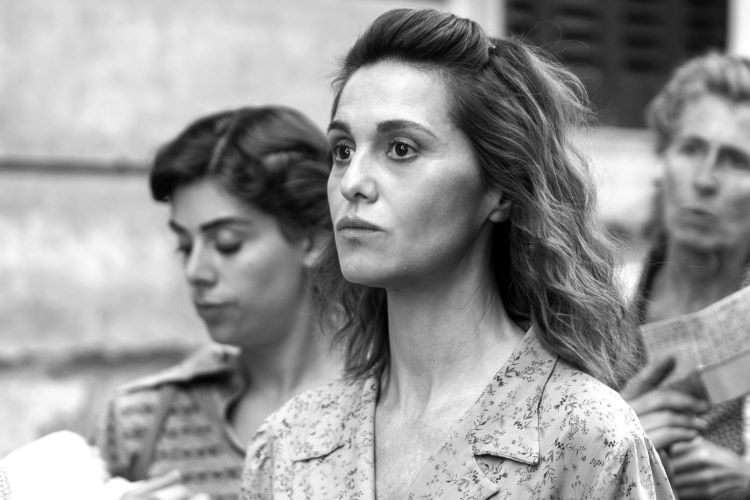
There’s Still Tomorrow is a relentlessly hopeful title, as the phrase holds within it the knowledge that today was at best, disappointing, at worst, replete with pain, sorrow, failure, and suffering. Filmed in luminous black and white, and set in a late 1940s working class neighborhood in Italy, Director Paola Cortellesi, who co-wrote the screenplay with Furio Andreotti and Giulia Calenda, evokes the Italy of those times, an Italy that feels familiar to cinephiles, for we know it from films. Yet Cortellesi infuses the film with an acute awareness that it is seen from a contemporary perspective, and as such, There’s Still Tomorrow is riveting, imaginative, funny, honest, suspenseful, and full of hope.
Cortellesi stars as Delia, who lives with her husband Ivano (Valerio Mastandrea), their three children, and her bedridden, yet vigorously rude, father-in-law Ottorino (Giorgio Colangeli). The impact of the war is keenly felt in the long lines at the local grocers, in the ubiquitous presence of the American Military Police, and the animosity still rankling between neighbors for their past actions and loyalties. It’s a harsh time, and its a man’s world.
Cortellsi sets the unique tone of this film from the start, which opens on a scene that evokes Italian neorealism, with its focus on the lives of the poor and working classes. Against a background of faded, flowered, wallpaper, Ivano is seen in the bedroom mirror, sitting up in bed, appropriately clad in a white wife beater, with his arms folded across his chest. As the camera moves to show Delia in bed with him, she wakes and says Bon Giorno, and he slaps her face. Delia accepts the blow with equanimity, proceeding to brush her hair, and go about her morning duties as if nothing out of the ordinary had happened. This morning scene opens a recurring, brilliant, motif utilized throughout the film, the contrast between the visual language and the often-anachronistic soundtrack. Delia’s hard-scrabble life is revealed while the sprightly tones of Fiorella Bini singing Aprite le Finestre, extoll the praises of spring. As the song urges “open the windows to the new sun,” one sees Delia open the windows of their basement apartment, just as a passing dog relieves himself on the pavement. Cortellesi makes use of cinematic cultural archetypes familiar to cinephiles and infuses those dramatic tropes with humor and artistic inventiveness. In other words, viewer, expect the unexpected.
Ivano rules with a firm hand, and no one questions his authority. He may be more aggressive than some other men, but his status as head of the household is firmly entrenched in the culture. No one can imagine a different status quo. Although she has had little or no formal schooling, Delia reveals energy, ability, and initiative as she scrambles to supplement the family income by taking in mending, administering injections to the elderly, washing sheets for the local hotel, and fixing umbrellas. She accepts Ivano’s abuse because she feels she has no alternative. She has nowhere to go, and she feels a responsibility to her children. The two young boys, constantly fighting and swearing, seem to be following in their father’s footsteps. Her daughter Marcella (Romana Maggiora Vergano) is appalled by the way her father treats them all, especially his violent and abusive behavior towards Delia. She feels angry and resentful towards Delia for allowing this behavior. In a home where her two brothers attend school, but Marcella is denied an education because she is a girl, a good marriage is the only way she can imagine escaping the horror of her home life. The prospect of a proposal from Giulio (Francesco Centorame), a young man from a prosperous family, might be the key to a better future.
Through Delia’s experiences, Cortellesi conveys the atmosphere of the times, especially the sense of community, as well as the distinctions and divisions between socio-economic classes, and political affinities. Theirs is a neighborhood life lived outdoors in the courtyard, with anyone and everyone feeling free to advise, comment, and gossip. Friendships are important, and for Delia, her friendship with Marisa (Emanuela Fanelli) offers moments of carefree joy, as well as support. Although Delia’s marriage is an unhappy one, it is not exceptional in its imbalance of power, as is demonstrated in many small moments throughout the film, the oppression of women permeates all aspects of life. Even though Delia attempts to stand up for herself, asking her employer at the umbrella shop why she is paid less than the new, untrained employee, she has no choice but to accept the answer: He is a man.
The pervasive, all-encompassing aspect of oppression is vividly expressed in the highly stylized scenes of violence. Ivano’s brutal abuse is depicted as a choreographed dance of violence, with bruises and wounds appearing and disappearing on Delia’s body (through CGI), to dissonant, romantic, music. This is the dance they do, time and time again, a continuous, inescapable, cycle. The oppression is systemic, and it takes so much more than one determined woman to change a system.
Cortellesi imbues Delia with intelligence and compassion, inviting empathy for the character. In a brilliant performance, Cortellesi lets the viewer into Delia’s inner world through the nuances of her expressive features. Even when she is silent, her eyes reflect her thoughts and feelings. When Delia receives a mysterious letter, it just might change everything for her. A narrative of secrecy and suspense is punctuated by many hilarious moments, and Delia – courageous, resourceful, and ever hopeful, had me cheering for her all the way. An outstanding directorial feature debut.
There’s Still Tomorrow
Italy/2023/118 min/Italian with English and Hebrew subtitles
Director: Paola Cortellesi; Screenplay: Furio Andreotti, Giulia Calenda, Paola Cortellesi; Cinematography: Davide Leone; Editor: Valentina Mariani; Music: Lele Marchitelli; Cast: Valerio Mastandrea, Paola Cortellesi, Vinicio Marchioni, Giorgio Colangeli, Emanuela Fanelli





